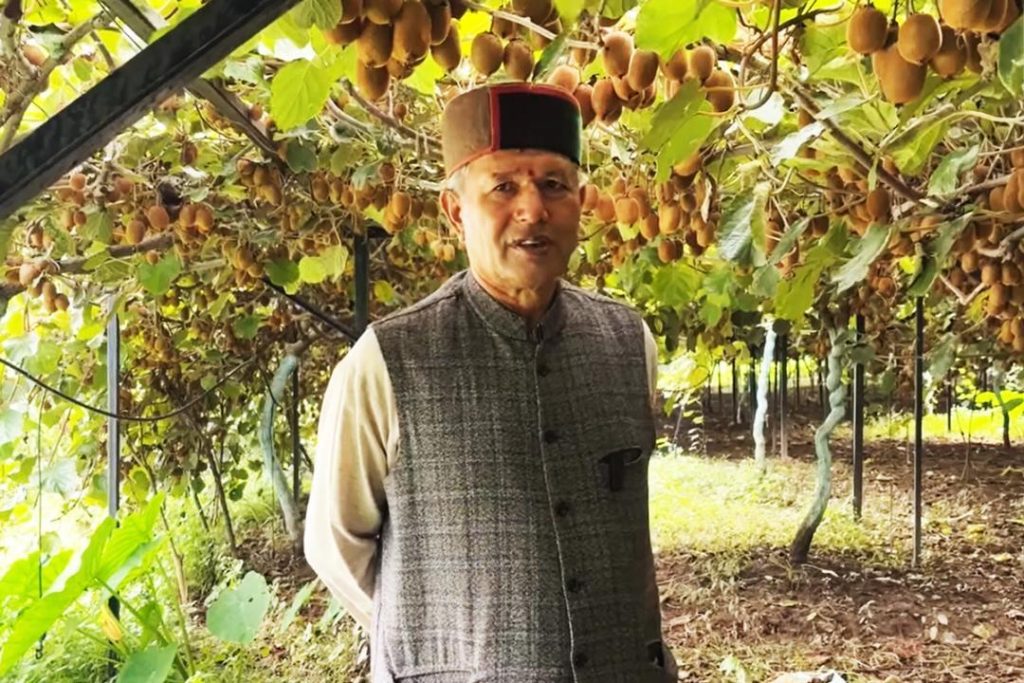
Solan Farmer Earns ₹21 Lakh/Acre with Organic Kiwi Farming
In a remarkable example of the potential of organic farming, Pratap Bharnal, a farmer from Solan, Himachal Pradesh, has achieved a staggering income of ₹21 lakh per acre by growing kiwis using only natural methods. This success story is a testament to the benefits of diversifying agricultural practices and adopting sustainable farming techniques.
Pratap, who has been farming for over two decades, initially began growing apples in Solan. However, as the rates of apple cultivation declined, he decided to diversify his crops to ensure a stable income. In 2017, he started organic kiwi farming on a small scale, with just 100 saplings. Today, he has expanded his operation to 400 kiwi plants, yielding an average of 52 kg every season.
The secret to Pratap’s success lies in his commitment to organic farming methods. He uses only water and cow dung manure to nourish his kiwi plants, eliminating the need for chemical fertilizers and pesticides. This not only ensures the health and well-being of his crops but also preserves the natural ecosystem of his farm.
Last season, Pratap’s kiwi harvest was a whopping 21,600 kg, earning him a staggering ₹21 lakh per acre. This is a remarkable achievement, especially considering the initial investment he made in setting up his farm.
So, what makes Pratap’s organic kiwi farming operation so successful? Here are a few key factors that contribute to his success:
- Soil Health: By using cow dung manure, Pratap is able to maintain the health and fertility of his soil. This natural method of fertilization also helps to reduce soil erosion and supports the growth of beneficial microorganisms.
- Water Conservation: Pratap’s farm is designed to conserve water, with a focus on efficient irrigation systems and mulching techniques. This not only reduces his water consumption but also helps to retain moisture in the soil, reducing the need for frequent watering.
- Pest and Disease Management: By avoiding chemical pesticides and fertilizers, Pratap is able to maintain a balanced ecosystem on his farm. This reduces the risk of pests and diseases, allowing his kiwi plants to thrive without the need for additional intervention.
- Crop Rotation: Pratap rotates his kiwi crops with other organic crops, such as vegetables and fruits, to maintain soil health and reduce the risk of pests and diseases.
Pratap’s success has not gone unnoticed, and his organic kiwi farming operation has attracted the attention of local farmers and entrepreneurs. His farm has become a model for sustainable agriculture in the region, and many are seeking to learn from his experiences.
In an interview, Pratap shared his thoughts on the advantages of organic farming: “Organic farming is not only better for the environment, but it also ensures a healthier and more sustainable way of living. By using natural methods, we can reduce our reliance on chemicals and promote a more balanced ecosystem.”
Pratap’s success is a powerful reminder of the potential of organic farming, not just in terms of financial returns but also in terms of the environmental and social benefits it provides. As the world continues to grapple with the challenges of climate change, soil degradation, and water scarcity, Pratap’s example serves as a beacon of hope for a more sustainable future.






